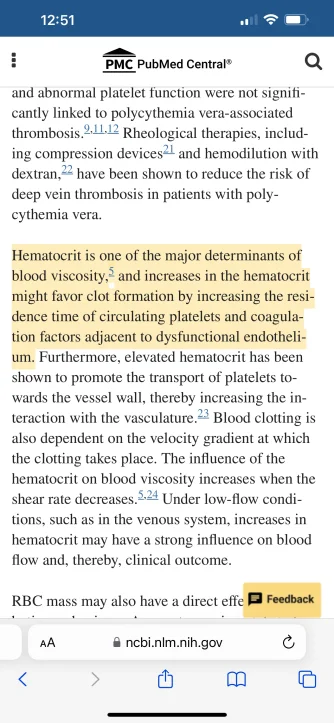Most studies I read say increasing hct is associated with clots:
That's what we have here, an association only, no cassation, similar to doctors once believing high cholesterol increases your risk of heart disease. Decades later the other 50% with heart disease have low cholesterol.
Many diseases increase your chance at clotting, sleep apnea, hemophilia, an inherited clotting disorder which causes
high hematocrit and clotting. This is why doctors freak out and associate it with harm when they see a
high hematocrit value on TRT, they think something is wrong with you and overreact.
My endo's response to my 58.5% hematocrit after speaking to a hematologist ->
I can’t tell you at what level of hematocrit is too high for you, but this is pretty high. I’d recommend at least monthly monitoring of your levels at least for the Hgb/Hct.
College of hematology advances in hematology.
->
No evidence exist that a high hematocrit is harmful, and a direct cause of thrombosis in testosterone induced erythrocytosis.
College of hematology put a position statement no risk of deep vein thrombosis. Cleveland the Mayo Clinic in 2018. TRT is not associated with the deep vein thrombosis.
Glenn Cunningham. Dr. Abraham Morgantaler, asked him both on stage and in person where did you come up with 54% cut off? His answer was
we actually don't have much data to say anything but we had to pick a number and it seemed like a reasonable number.
With a secondary erythrocytosis there is an
increase in blood volume which enlarges the vascular bed, decreases peripheral resistance and increases cardiac output. Therefore, in a secondary erythrocytosis
optimal oxygen transport with increased blood volume occurs at a higher hematocrit value than with a normal blood volume. A moderate increase in hematocrit may be beneficial despite the increased viscosity.
There are over 80 million people that live higher than 2,500 meters and they develop a secondary erythrocytosis. Men in parts of Bolivia for instance have a normal range of HCT from 45-61%. These men are not at an increased risk of thrombotic events nor do they have to undergo phlebotomies to manage their hematocrit.















